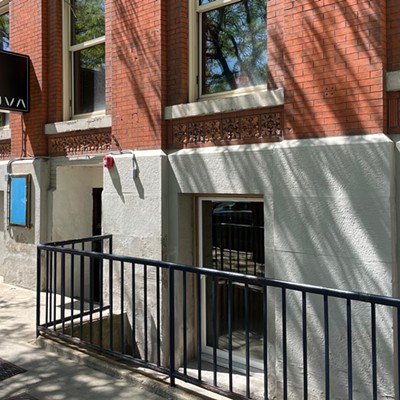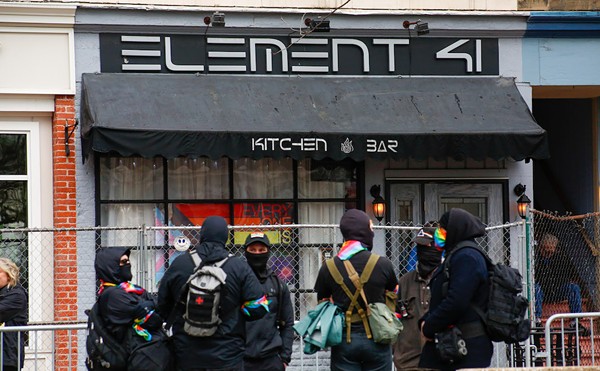"I've confessed my sin and asked the Father to forgive me, and he has," Manning says. "It takes time for you to forgive yourself."
Manning works for a coin dealer now. Not by choice. For as long as he can remember, he's been waking up before the sun and setting off for church. Churches in Oklahoma, California, Thailand. He's been shepherding the faithful for close to 30 years, since he was a young man in Oklahoma just coming to know Jesus.
Now he is left to pile into the pews with the others, at a church that accepted him and his high-profile sin.
The other days, Manning wakes before the sun and sets off for Chagrin Falls and the coin company. He pulls out of his driveway, seeing the For Sale sign in front of his modest Parma Heights colonial. "We just can't afford everything," he explains.
His sin has a stranglehold on his life. Perhaps it eased up when the first jury set him free, voted his sin one for God to handle. But he knows there will be more judgment. Probably a new jury, after the lawsuit comes. Even if he survives that, another jury -- the nonjudicial kind -- will decide whether he's worthy of becoming a shepherd again.
Salvation came at a dusty gas station in Chickasha, Oklahoma. It was 1978. Manning had left Eaton Rapids, Michigan, and was headed for Texas. He was 20, didn't have a plan, didn't have Jesus.
To break up the trip, he stopped to visit his aunt and uncle in Rush Springs, Oklahoma. He hung around town, and one day headed down to Oklahoma City. He stopped along the way, at a gas station in Chickasha. As he filled up, a man called to him.
"What are you doing in Oklahoma?" the man asked, noticing Manning's Michigan plates.
"Just passing through," Manning told him.
But the man wouldn't let him just pass through. He asked Manning to follow him to his office at the University of Arts and Science of Oklahoma. Manning soon found himself in the Baptist Student Union, talking about God. The man from the gas station, Ken Shiplet, was the BSU's director. It was Shiplet's job to see that everyone passing through was formally introduced to Jesus.
Manning dropped to his knees that day. By the time he rose again, he was a Christian.
Jesus worked fast in Richard Manning. The night he was saved, he stayed at a Chickasha motel. He awoke at 3 in the morning to read scripture: Second Timothy, chapter 2, verse 2. Go and teach others.
Right then, in the middle of the morning, Manning called Shiplet and told him the exciting news. The next day, he was introduced at the local church as the new boy with Jesus in his heart. He was baptized soon after and preached his first sermon three weeks later.
Six months after that, he asked Shelly Calvert to marry him. Turns out she felt a call, too -- to marry a pastor.
And God kept dropping people into his life. After he and Shelly moved to Kansas City, so he could go to seminary, Manning awoke one morning with a toothache. He asked his wife to find a dentist in the phone book. The first doctor had an American name. "But it was a Thai woman," Manning says. A warm, soft-spoken woman named Dr. Anderson, with whom the Mannings immediately bonded. "This is gonna sound weird," he says. "But again, I think this was a God thing." They had come across plenty of international students at school and thought maybe God wanted them to spread His word overseas.
A pastor at a gas station, true love in Chickasha, Timothy at 3 in the morning, and now a Thai dentist?
Loud and clear, Lord.
The Mannings left for Thailand in 1985, on a mission sponsored by the Southern Baptist Convention. Along with two young sons, they lived there for the better part of 12 years, learning the Thai language and culture, and using it to share God's word. Richard taught seminary classes and helped his students start new churches.
They returned in 1998. Manning worked briefly as a pastor near San Diego, then returned to lead a church in Oklahoma City. "He had a heart to win people for the Lord," recalls parishioner Robert Litke. "He was a godly man."
They were in Oklahoma for five years -- until God told them they needed a change. Needed to flee the Bible Belt, go in search of untilled land, where there weren't Baptist churches on every corner.
A little church in Ohio caught their eye.
Parma Baptist was built in the 1970s, after starting in a small schoolhouse nearby. It's since grown into an octagonal building, the Sunday home to a good 250 Southern Baptists. Its members range from slow-moving ladies in pretty pastel hats to young men with shaggy hair and baggy pants. They pile into their two-level worship hall, which still seems decorated for the '70s, singing simple hymns and hearing about who found Jesus the week before.
Every so often, they also get together for a mini-carnival on the church grounds. That's where, last September, a chatty woman named Elaine Cigmond told Richard Manning there was someone he should meet.
Manning had been in Ohio just a few weeks, but the congregation knew his story: He'd spent a decade in Thailand. So Cigmond introduced him and his wife to a small, olive-skinned woman with thick black hair and pensive eyes. Her name was Premsuda Jantarapet. She was 42, just a few years younger than the pastor.
She was raised in Songkhla, near Thailand's southern tip, the daughter and sister of judges. She came to the United States in 1995 and soon gave birth to her son, Otto. Twice divorced, she now lived in Parma, just a few miles from the church, in a little white house with a crucifix nailed to the front door. She made a living doing massage at a spa in Rocky River. She also did Thai massage out of her home, using the techniques she had learned from her grandmother as a child.
Jantarapet didn't attend the church, but she was deeply religious. She was raised Buddhist, but had become a Christian in 1996, shortly after moving to California. She spoke often, in her broken but passable English, of her relationship with Christ, and she prayed incessantly.
The Mannings spoke with her only briefly that day. But soon after, she started showing up at Parma Baptist on Sundays to see Manning preach. One afternoon, Manning called Jantarapet at home. He wondered if she wanted to pray.
On the morning of December 11, Richard Manning gave his regular Sunday sermon, imploring the people of Parma Baptist to be better Christians. By that afternoon, two police officers were in his kitchen, arresting him.
He was calm as they placed handcuffs on his wrists, as they escorted him to a small, bright room at the station, where he was greeted by Detective Tom Connor.
The young detective was calm and quiet too, allowing Manning to talk freely. The pastor, in his low, raspy voice, explained his relationship with Jantarapet. How they met at a church party. How she occasionally called him for help around the house -- when her thermostat broke, when her basement needed paneling, when the dryer she ordered never arrived.
Connor let him talk. Then he put his concerns on the table. I have a sheet, he told Manning. It has a stain. It's on its way to get tested for DNA. "Is that gonna come back to you?"
The detective had collected it the night before after being called to Jantarapet's house, where she told him she'd been raped several times by the pastor and that he threatened to have her deported if she told anyone.
Manning's face was blank, lifeless. "Not for rape," he said. A breath. "She gave me a hand job. I never forced her to do anything." He was stupid, he told the detective, and gave in when she rubbed up against him.
"Have you ever had sexual intercourse with her?"
"No," Manning said. "I have not."
But . . . that sheet. "There's a hell of a lot of semen," Connor told the pastor.
Manning tried to explain the stains, describing the volume and trajectory of his ejaculate. Later, when jurors watched a videotape of the interview, this would be its most gut-wrenchingly awkward moment: a pastor of 30 years, calmly explaining, "I squirted . . . I shot."
Connor asked again: "You did not have intercourse with her?"
Manning stuck to his story, but it was sliding away from him. "I did not have intercourse with her -- this week."
His voice fell quieter, lower. It was a while back, he said, and just one time. But he didn't force her to do anything. And those dates she was giving, the days these supposed rapes occurred? He had alibis for them, he told Connor. But the damage was already done.
"My career is shot," he confessed. "I know that."
A few days later, a grand jury charged Manning with 17 felony counts, including rape and kidnapping. He was a headline on the TV news and even made the papers back in Oklahoma. He resigned as pastor.
The next time he saw Jantarapet, she was in a Cuyahoga County courtroom, raising her right hand.
Manning settled into a chair in Judge James Sweeney's courtroom, wearing a drab suit and a patient expression. In a sharp black suit, Jantarapet strode purposefully to the stand.
Assistant Prosecutor John Kosko, a bullheaded lawyer who handles the county's most serious cases, provided a translator, though Jantarapet didn't seem to need one, often bypassing the interpreter to speak in English. "Talk in Thai," Kosko would remind her, seemingly trying to present her as a vulnerable immigrant, someone who didn't even hold the power of speech in the adopted tongue.
After they met at the church party, Jantarapet explained, Manning began calling her. First, it was to pray. She called him "Ajan," Thai for a respected teacher. He asked her how she came to know Jesus and told her that perhaps she was the reason God had called him to Ohio.
One day Manning asked for a massage. She walked on his back and dug into him with her elbows, the hallmarks of Thai treatment. He asked to come back the next day, November 12. That's when he removed his pants, she testified.
He had a pain in his thigh, he said, and wanted her to make it feel better. She warmed a towel and placed in on his thigh, and watched him become aroused. Then, she testified, he took off his underwear and moved her hand until it was touching him.
Jantarapet's voice, which had been strong and deep, began to crack. "He took off all my clothes," she said. Then she began to weep, raised her hands and head to the sky. "God help me!" she cried.
When she composed herself, Jantarapet told the jury that Manning pulled her to the ground, removed her pants, and pushed himself inside her. It was brief, she said. When he finished, she went to a room to clean herself and cry to God. Manning left, but later he called to check on her.
"I said to him, 'This is a sin. This is a sin. What are you doing to my life?'" she told the jury. "I cry. I cry, and I told him that repentance is needed."
Jesus already died for my sins, Manning told her.
Kosko asked why she hadn't called the police. It was a question that would be asked again and again, by both attorneys and, no doubt, the jurors. After all, it's difficult to predict how any rape victim might react, particularly when the assailant is Ajan, a pastor and respected teacher. That Jantarapet was shaped by a traditionally submissive culture only compounds the issue.
Kosko understood. He belabored the point, knowing that Jantarapet's motivation would be critical. "This is a woman who is scared," he said. "But she's not telling on him. She's not ratting him out because he is the pastor, and she is this Thai immigrant."
Friend Tammy Brumley, a youth pastor at Bethel Temple, echoed that thesis, testifying that Jantarapet "didn't want to call the police. She didn't want to get anybody in trouble."
But for those who have never been raped, the question always lingers: Why didn't you call the police?
Jantarapet broke down again, sobbing heavily. Manning told her not to tell anyone, she finally said. "Do not play with my position." He could have her deported, he added. So she didn't say a word.
Over hours of testimony, Jantarapet told of four more rapes, each a brief encounter in the massage room. He used his own key, one she had left for him so he could do work in her basement. Otto wasn't home, or was asleep, or was simply in another room. They went to the massage room. He pulled her to the mat, raped her, and left.
On one occasion, "He put two hands to my neck and said he could break my bone," she testified.
She told him no, Jantarapet said. And Manning had prayed that his feelings would go away. It wasn't working. She was too beautiful, inside and out.
"I was in shock," she told the jury. "I don't know what to do."
A friend's husband later testified that he changed her locks three times. He didn't know why he was doing it; he just did. But Manning somehow ended up with a new key each time, Jantarapet said.
It wasn't until December 10, almost a month after the first incident, that she finally broke down, Jantarapet told the jury. Friend Kathy Sumner arrived for a massage. Jantarapet began talking about the pastor at a local church. They had had sex, she said. "She was weeping," Sumner later testified.
Sumner called Brumlee and David and Elaine Cigmond, members at Parma Baptist, to relate the story. It was Brumlee who pushed the matter. This was not a matter for God, she told Jantarapet -- at least not at that moment. The higher power now was the police.
Jantarapet gave detectives her stained sheets and towels, her journal, and her calendar. On it, Jantarapet had drawn little hearts over several dates. Those were the days, she told the jury, that she had been raped.
In the journal, she had scrawled her thoughts in broken English and Thai. "Pastor said Nobody believe you, don't play with my position," she wrote. "He said he is the top of the church. Nobody bigger than him at the church. He is the boss and every person loves him."
Jantarapat was followed by a parade of witnesses -- medical professionals, church officials, friends on both sides.
Richard Manning wasn't among them.
Perhaps this was to avoid questions about his past, specifically his departure from Thailand in 1998. According to the International Mission Board, the Southern Baptist organization that sent him abroad, Manning was fired that year. The official reason, according to an e-mail sent to police, was Manning's "failure to maintain a lifestyle in keeping with the expectations of missionaries." An IMB spokesman confirmed that Manning was fired, but wouldn't elaborate. In one of several interviews with Scene, Manning declined to discuss the matter, saying that he needs "to wait to comment," in case Jantarapet sues.
According to Kosko, Manning was fired for having an extramarital affair.
But as long as Manning didn't take the stand, Kosko couldn't confront him about it. Instead, Manning's lawyers used old friends to talk up the pastor, then sawed away at his accuser, dismantling her story.
In her opening statements, Susan Moran, Manning's jovial but fierce defender, built an alternative tale. This is not a weak, helpless Thai woman, Moran said; do not believe her charade. She speaks English just fine, but uses her timid Thai persona to get people to do things for her. That's how she suckered the Mannings into helping her around the house.
Yes, Moran said, Richard Manning had an affair with this woman, gave in to her temptations, and threw away his career. In the church of Jerry Falwell and Billy Graham, sins of the flesh are an ecclesiastical felony. "He's a minister," she said. "He's in the business of morality."
So he broke it off. That left Jantarapet hurt and hunting revenge, Moran said. She called the cops, cried rape. Then she hired a civil lawyer. "She's hoping to sue and get her lottery windfall," Moran told the jury. "And that is why we're here today."
Old friends went to lengths to vouch for Manning's character. "The church members loved him," said Nuansri Vongchanyakul, who went to Manning's church in Thailand and considered herself part of his family. "He was always caring."
Vongchanyakul drove two days from Oklahoma, where she was staying with family, to testify for Manning. So did Art Black, a deacon at Exhange Baptist, where Manning served briefly in the 1990s. "He was always held in high esteem," Black said. "He was always a compassionate man."
But Manning hadn't paid his lawyer to be compassionate. The pastor's real defense was jackhammering Jantarapet on the stand. "You do understand English, don't you?" Moran asked her to start. "If I speak slowly, you'll be able to understand me, won't you?" She wanted to skip the translator, it seemed, to show jurors that this was no helpless immigrant.
Moran pointed out all the help Manning provided Jantarapet -- with the thermostat, the basement, the new dryer. This was a friendship, then a romance, Moran asserted, not a pastoral power play. And it was Jantarapet who came on to him during those massages, Moran said.
To ground the theory, the lawyer exploited every decision Jantarapet made at the time of the alleged rapes. She pointed to 15 phone calls Jantarapet made to Manning's cell phone in early November and several more that winter. Moran asked about food Jantarapet made for the Mannings at Thanksgiving. And there were witnesses who remembered Jantarapet standing up at a Thanksgiving prayer session to thank God for sending their new pastor.
The calendar turned into one of Moran's fiercest weapons. Manning's birthday was noted. "You wrote your rapist's birthday on your calendar?" she asked Jantarapet.
Then there were the hearts, which Jantarapet swore signaled the days she had been raped. If they're supposed to signify broken hearts, asked Moran, why weren't they broken?
"Those are the dates that he raped me," Jantarapet countered, but the damage was done, and there was more to come.
Moran asked about a day in December, days after Jantarapet claimed she'd been raped. She asked the pastor to pick her son up at school. He was sick, Jantarapet explained, and she had to work. She didn't have anyone else to call.
Moran seized the opportunity with sarcasm worthy of Boston Legal: "So you decided to call the rapist?"
Even Elaine Cigmond, who introduced the pastor to Jantarapet, would prove damaging. She spoke of the night Jantarapet called and claimed that she'd been raped.
"I didn't believe it," Cigmond testified. "I was supposed to be her best friend, and she didn't mention it. It didn't fit."
How close she actually was to Jantarapet is unclear; but as far as jurors knew, they were best friends, and Cigmond was torching Jantarapet's credibility. She even remembered, word for word, something strange Jantarapet had said that night. "It's not fair," Cigmond recalled Jantarapet saying. "He has sex with me and goes home to his wife."
That was the last time she spoke to her best friend, Cigmond said. She had, however, stayed close with the Mannings.
Day by day, two groups formed in the courthouse. One was a cluster of chatty women who filled the seats and stood near the door during breaks, wondering aloud what might happen in the end. They were Jantarapet's friends, the women she had called to say she'd been raped.
The other was a group of middle-aged folks who rarely stepped into the courtroom, opting instead to wait in the hallway, out of earshot of the sometimes graphic proceedings. The characters changed, but one woman was always at the center: Shelly Manning.
Now, on a July afternoon, she stands in the near-empty courtroom, in the middle of the commotion, her arms draped around her husband as he answers questions from the media. It appears that she has decided to believe her husband's tale of infidelity -- just as the jury had moments before.
It took them five hours to find Manning not guilty on all charges. Moran had poked sufficient holes in Jantarapet's timeline, offering possible alibis for each incident. But in the end, it was Jantarapet's behavior -- especially her calling Manning to pick up her son -- that Kosko believes damaged his case. "That was something I had a lot of difficulty explaining."
Manning will return to his new church. He'll get counseling, and maybe someday he'll preach again. If a church will let him. If God tells him to.
The people of Parma Baptist will move on, too, looking for a new pastor, yet holding no ill will toward their old one. Ask them about Manning, and they won't say much. "Nobody's perfect," they'll say, or "Everyone makes mistakes." Other than that, they just keep showing up on Sundays to sing and hear about whoever has found Jesus. On a recent Sunday, it was a young man who looked 19 or 20. He'd found Jesus just the day before.
Jantarapet has a new pastor at a new church too. You can find her there every Sunday. She's also got a new lawyer -- Tom Robenalt, from a successful personal-injury firm.
Manning expects a lawsuit. He may have to answer questions about that affair in Thailand, those stains, or why Jantarapet kept changing her locks. But he doesn't seem concerned, at least not now, in the wake of the first verdict -- the one that kept him free.
"We do not harbor any hard feelings toward her at all," Manning says in the empty courtroom. "I hope she will forgive us."
His wife looks at him. Her face shifts, from a look of relief to one of surprise or maybe scorn.
"I don't know if that's exactly what you want to say," she says. "You didn't do anything wrong."













